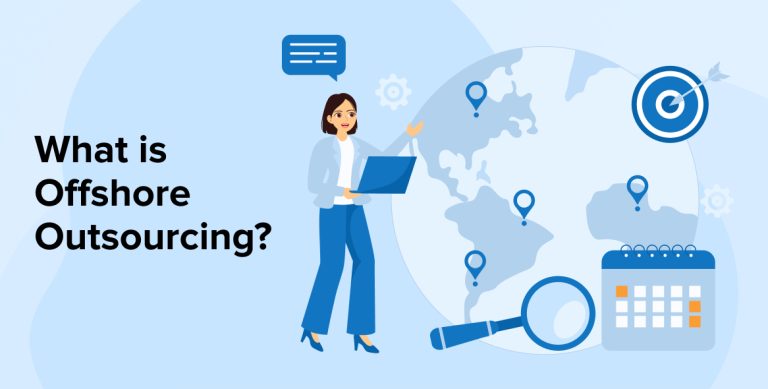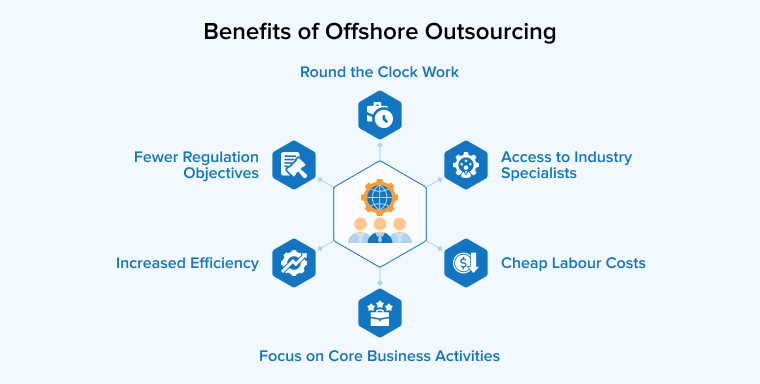
In today’s modern world, enterprises of all sizes are facing competition and to be at the top they not only want the best software but also want to cut the development costs to save more amount of money. So, to reduce software development costs, increase margins, and improve their services, businesses prefer to hire outsourcing companies. There are mainly three types of outsourcing processes: Onshore outsourcing, Nearshore outsourcing, and Offshore outsourcing. In this blog, we will learn more about what is offshore outsourcing and have a look at its pros and cons.
1. What is Offshore Outsourcing?
Offshore outsourcing is a practice in which businesses hire an external organization to create projects for their company. The hired firm will be located in another country than where the product is going to be used. When the development of the product is outside the country, it is known as offshoring. The cost of offshoring with a software development company is lower than hiring a software development service provider from the same place. It is a business model for managing IT services efficiently at a lower cost. For instance, businesses from developed countries like the USA hire offshore companies from places like India as they get the best services at lower rates.
2. Benefits of Offshore Outsourcing

Below are the main benefits of outsourcing business processes from an overseas location:
2.1 Cheap Labour Costs
Hiring an offshore outsourcing team from Asian countries or under-developed Eastern European countries offers the best services at lower labor costs and the main reason behind it is that the legal wages here are less. Besides, the talent available in these countries is excellent which is a bonus for many foreign companies. Thus offshore outsourcing services from these countries result in cost savings.
2.2 Access to Industry Specialists
Generally, hiring specialized experts in software development or any other IT field is difficult, especially in domestic regions. Therefore, the majority of businesses prefer offshoring experts for these technical operations. This practice is known as knowledge process outsourcing.
Places like India and the Philippines offer a large talent pool of offshore developers and engineers to the world. Hence you can have access to skilled professionals at cheaper operational costs. And these professionals are well-versed in the English language which is very beneficial as the communication between clients and the developing team becomes smooth.
2.3 Round the Clock Work
One of the most important benefits of hiring an offshore outsourcing team is that the experts are available 24/7. The Internet has expanded business hours. This means that if the client faces any major issue with the technical service, they can immediately contact the developers and get the issue resolved at any time. Besides, offshoring offers more practical technical support than any other type of software development company.
2.4 Increased Efficiency
Often it happens that businesses don’t have the in-house expertise for a specific task and then one person has to handle multiple tasks. For instance, managers also have to do marketing jobs. This is why businesses hire outsourcing experts to get their jobs done efficiently and effectively.
2.5 Focus on Core Business Activities
Offshore outsourcing allows businesses to focus on their important tasks and handle all the other development-related jobs. For instance, when a company hires an outsourcing developer, the firm can focus on its routine rule-based tasks, and the hired resource can focus on the development aspects. This helps in reducing the work stress of the in-house teams and completing the project on time at a faster rate.
2.6 Fewer Regulation Objectives
When any business organization hires an offshore software development company, there are very few legal regulations and procedural paperwork. The main reason behind this is that the hired company works as a freelancing firm, so they only have to sign one or two contracts. This also ensures that the development procedure starts quickly.
3. Drawbacks of Offshore Outsourcing

One of the common drawbacks of offshore outsourcing to a different country is the language and cultural barrier. Apart from this, there are various other drawbacks.
3.1 Security Risks
Hiring a software development team outside the firm means that the business organization will have to share confidential information with the hired partner. And this is where most companies feel concerned. Besides, businesses are also worried about keeping clients’ data safe. Therefore, they generally try to hire an in-house team of developers to keep the important data secured inside the firm.
3.2 Lesser Control
When the team outside of the firm handles the software development projects, the work gets done faster but the hiring organization has no control of the working process. For instance, if any issues arise in the system, the firm will have to wait for the offshore software developers to complete the task, as they won’t have the details or controls over the project. Companies have to tread carefully to manage quality control of the project delegated to the outsourcing firm.
3.3 Different Time Zones
For some companies, time zone differences can be difficult. Generally, offshore outsourcers are located around 5-12 hours away from their clients and this changes the working hours for both parties. Both the client and the hired development team will have to optimize their working hours to ensure productivity which might be challenging. And this is why some companies prefer hiring an in-house team rather than outsourcing the talent.
3.4 Regulations and Hidden Costs
When clients are not familiar with foreign regulations and in this case, while hiring the outsourcing team, they haven’t had a clear conversation about all the intellectual property rights. there are chances that the client will lead to unexpected hidden regulations or costs. This is something all businesses are concerned about before hiring an offshore partner.
4. Types of Offshore Outsourcing
There are multiple forms of offshore outsourcing but you must know about two of the most important categories:
4.1 Production Offshoring
Production offshoring, also known as Business Process Offshoring includes, outsourcing non-core business processes. This offshoring category can be divided into two parts:
- Front-office solutions: Includes customer support, technical support, inbound/outbound telemarketing, virtual assistant, and other customer-facing services.
- Back-office solutions: Involves accounting and bookkeeping, HR and recruitment, app and web development, graphic services, and other internal functions.
4.2 System and IT Offshoring
Systems and IT offshoring include outsourcing IT processes or IT-intensive services such as data storage and management, IT support, software development, cloud computing, and more.
Since 1990, India has been a popular destination for software outsourcing due to the availability of a large pool of talented developers and English speakers at affordable rates. Top companies including Microsoft, IBM, Intel, HP, Oracle, and Cisco have outsourced their services to India.
5. What Kind of Business Activities Can be Outsourced Offshore?
Any business can opt for offshore outsourcing from startups to enterprises to obtain better results. Here are some of the services that you can consider outsourcing to an offshore company so you can focus on your core business.
5.1 Software Development Services
Programming languages are standard across the globe, making it easy to outsource software development. The major reason why businesses choose to hire offshore developers is to obtain better solutions within their budget.
Outsourcing software development not only allows you to speed up the process but also enables you to tap into the global pool of talented professionals with skills in cutting-edge technologies. They ensure all your requirements are met by creating and delivering a quality product.
5.2 Customer Support
Customer support is the most common service that businesses like to outsource. It allows them to offer customer support 24/7 without any additional costs and the need to handle an in-house team.
Here, the offshoring team is entrusted with services like handling customer complaints and answering their queries through emails, phones, and social media. These offshoring companies often run dedicated call centers to streamline the entire process and leverage different languages for different markets.
Customer support services are mainly offshored to free up the in-house team from managing a large number of customer interactions so they can focus on more complex business processes.
5.3 Back Office Support
Offshoring back-office support means setting up a remote back-office. It helps bring down the costs and streamline operations. All back-office tasks such as accounting, recruiting, data entry, research, designing, and more are outsourced to allow the in-house teams to focus on their core business activities.
6. Conclusion
Offshore Outsourcing is an expedited business process outsourcing with countless benefits and perks. There are challenges but there are resolutions too. By investing in offshore outsourcing, You can quickly get the return on investment and your business will be able to gain a competitive edge. Offshore partners are a blessing for large and small businesses if you know how to make the best out of them.






This article provides an insightful overview of offshore outsourcing, with its benefits and drawbacks. It effectively explains the concept of offshore outsourcing, where companies entrust external organizations with project development. Thank you for sharing!
The article discusses the significant benefits of offshore outsourcing, including cost savings, increased efficiency, access to industry specialists, and more. However, it also raises awareness of potential drawbacks such as security risks and dealing with different time zones. Keep sharing!